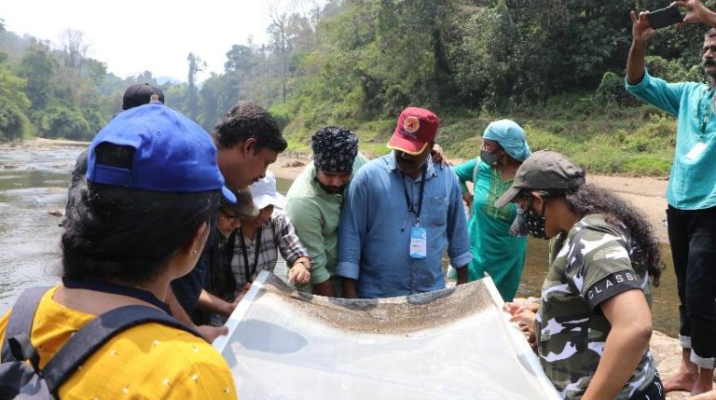Monitoring rivers using bioindicators provide the most integrative view of river health. With increasing industrialization, population growth, land use changes and developmental challenges, the natural ability of rivers to provide goods and services have been severely curtailed. This proposal is designed to train a cohort of Indian stakeholders – policy makers, scientists and practitioners –and members of Biodiversity Management Committees (BMC) -the grass root level body for implementation of India’s Biodiversity Act along the districts through the river Pampa flows. A 3-day use-inspired theory and 2-day solution- oriented river expedition are prime features of the training (for the participants except the grassroot level bodies). The hands-on activities will include transect studies of a major Kerala river, Pampa, starting from its hilly watershed, populated mid-plains and the lower Kuttanad and the Vembanad lake in the backwaters of the Arabian sea. Along with the anthropogenic pressures, climate change related sea level rise also aggravates the lake situation. The participants will be trained intensely for the critical river health assessment parameters like catchment health, Biota health, Flood plain health, Flow health, and River channel health. Lake system is one of India’s most unique Ramsar sites lying 0.6 to 2.2 meters below sea level, and is Kerala’s famed ‘rice bowl’. The participants will be trained by scientists from India, and abroad. The grassroot level training will be conducted for the local bodies across the region after the National level training. The sustainability of the activities will be followed-up through technical support and by linking participants to India’s Long-Term Ecological Observatory (I-LTEO) program launched at the ‘Paris Climate Conference 2015’to monitor eco-sensitive and bio-diverse sites, aimed at promoting national sustainable development.
Project leader
Collaborators
N. Anil Kumar, Project Leader
"This project trained me that people are basically “Rivero philic”, but unfortunately this love gets pushed behind due to ignorance about the intricacies of river health system functions and lack of skills in integrated river system management. What is critical is to provide them with evidence-based knowledge, technology-based skills, and innovative strategic approaches in river health management. They will do the rest!"
Prajeesh Parameswaran, Project Collaborator
"The project has influenced people. Let them try, and let them feel a river moving in them; People-centered actions will always be winning.’ (Rumi said, “When you do things from your soul, you feel a river moving in you, a joy.”)"
T. K. Balakrishnan Nair, Trainee
"This flow should not stop, let it reach to the authorities"
Project publications

Equipping local self governments and development practitioners in managing common pool resources – A case of Pampa River in Kerala State, India

Aware the local stakeholders of the health of the Saptalingi River in Sangameshwar block, Ratnagiri district, Maharashtra

Project final report: CBA2018-10SY-Kumar

Pampa River Rejuvenation Plan 2030: A People’s Framework for Action Projects

A photo report on the progress of a training project in building stakeholders’ capacity in the health & restoration of economically and culturally important rivers of India using Biological Indicators

